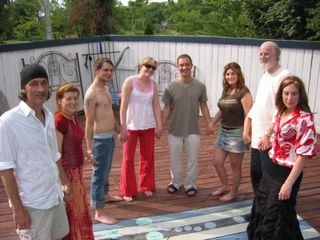
This Sunday we will be celebrating the Dances of Universal Peace for the second time this year. The group wanted to find a way to offer a space of sacredness and fellowship to the community. The dances provide an avenue to actively explore the beauty and diversity of various spiritual traditions. They are also provide an inner path to self realization and open the doorways between hearts - thus enabling the participants to discover the divine in one another. Developed by Murshid Samual Lewis (Sufi Ahmed Murada Chishti), these dances are inspired by the wisdom and sacred phrases of various spiritual paths, they are essentially a form of celebration and meditation in sound and movement.



